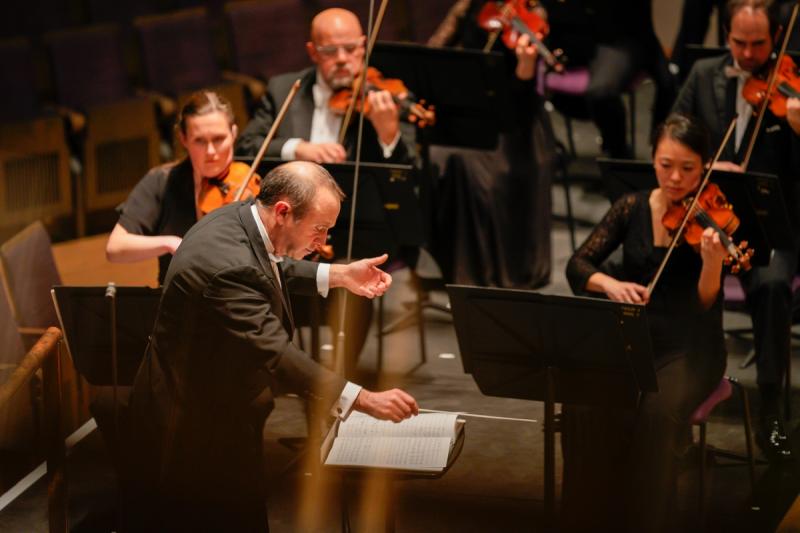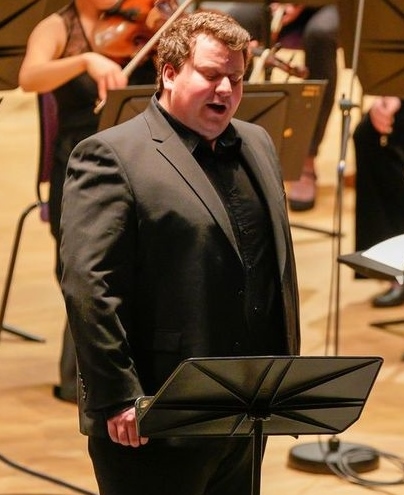Fisher, BBC Philharmonic, Wigglesworth, Bridgewater Hall, Manchester review - war-tinged Vaughan Williams | reviews, news & interviews
Fisher, BBC Philharmonic, Wigglesworth, Bridgewater Hall, Manchester review - war-tinged Vaughan Williams
Fisher, BBC Philharmonic, Wigglesworth, Bridgewater Hall, Manchester review - war-tinged Vaughan Williams
Launch concert of a cycle and a long international celebration

There was no overt reference to the world outside in this concert, and yet the poignancy of its content could hardly have been clearer if it had been planned: two symphonies and a song cycle each touched by the tragedy of war.
It was the launch event of RVW150, a national and international celebration of the music of Ralph Vaughan Williams, stretching from this year well into next, to mark the 150th anniversary of his birth. In Manchester the Hallé and BBC Philharmonic are presenting all his symphonies in concerts over the next 11 weeks, a cycle entitled “Toward the Unknown Region”. And in the first of those, the BBC Philharmonic offered his Third (Pastoral) and Fifth, along with his Housman song cycle On Wenlock Edge.
All three are, on the surface, often suffused with the calm beauty of the English landscape, but awareness of the times when they were written brings a reflection on the things soldiers left behind them, longed to return to, or held in their hearts as a hope for the future. The message of the music (as with Martinů’s symphonies of the Second World War era) is very much to do with context.
It’s long been clear that the VW Pastoral, first heard in 1922, is about much more than cows looking over gates, and under Mark Wigglesworth’s baton the BBC Philharmonic strings, led by Zoe Beyers, did not simply rest in the dolce “English” sound we associate with his scoring. They found an element of stridency in it, too, its disturbing undercurrents of pain apparent in searing climaxes, and the lack of finality in the ending of its first movement clearly caught.
The Lento moderato (all the movements are marked lento or moderato, and this is both), with its famous phantom bugler trumpet solo, trying to sound the Last Post (echoed equally eloquently by the solo horn), was striking in those moments of stasis, and in the third movement (a plodding sort of scherzo) the would-be folksong tunes sounded ironic – a million miles away from John Barleycorn – as well they might.
The performance did not quite retain that intensity all through to its end, and using a tenor voice rather than soprano for the off-stage vocalise of the finale (though for obviously understandable reasons, as the voice belonged to Alessandro Fisher, pictured below, the soloist in the song cycle to come), did not carry the same haunting quality, and was a little overwhelmed, as heard in the hall, in the lowest register. But the strings were magnificent in the emotional high point that preceded it.
 On Wenlock Edge is a setting of Housman, the poet whose work many a First World War Tommy clutched alongside his New Testament in the trenches, and whose references to young men’s loss and death, based on memories of the Boer War, became ever more meaningful then. Its orchestral setting, heard here with the same full string forces as the symphonies, presents problems of balance that the earlier piano and string quartet arrangement did not. It was a brave Alessandro Fisher (pictured left) who sallied forth to do battle with the BBC Phil in it, and the subtler elements of expression were hardly available to him. Of course this may not be an issue for Radio 3 listeners when they hear it, but it was in the hall.
On Wenlock Edge is a setting of Housman, the poet whose work many a First World War Tommy clutched alongside his New Testament in the trenches, and whose references to young men’s loss and death, based on memories of the Boer War, became ever more meaningful then. Its orchestral setting, heard here with the same full string forces as the symphonies, presents problems of balance that the earlier piano and string quartet arrangement did not. It was a brave Alessandro Fisher (pictured left) who sallied forth to do battle with the BBC Phil in it, and the subtler elements of expression were hardly available to him. Of course this may not be an issue for Radio 3 listeners when they hear it, but it was in the hall.
The accompaniment has its vehemence, and the Philharmonic players rose to that, as well as to its gentler side – the ending’s solo violin and solo cello (Peter Dixon) beautifully played.
VW’s Symphony No 5 was first heard during the Second World War, but much of it was conceived earlier. And we should remember that by June 1943, Alamein had been won and there was a distinct sense of the tide turning and indeed of victory being within sight.
It’s the more meaningful for its sense of faith in the future and evocations of the numinous (something its composer, though more agnostic than believer but also an organist and hymnal editor, knew how to create): its musical origins lie in the planning of the opera, The Pilgrim’s Progress, that Vaughan Williams laboured on long and devotedly.
There are many pianissimi in the score: it’s always interesting to hear how much variation conductors and players can find in the realization of that one simple request, and here there was a wide span of decibel levels in passages which shared it as their dynamic mark.
Like the Third Symphony, it’s often restrained in tempo, though its Scherzo is a Presto whose jogging tunefulness came out rather in the style of Dukas’s Sorcerer’s Apprentice on this occasion. The woodwind playing of the Romanza was a joy, and there were lovely ultra-soft moments from the orchestra… a foil for the swirls of sound that bring the work to its finale’s climax and ultimate, optimistic, resting place. Some of its writing has been heard as a variation of the “Alleluia” of the composer’s tune to “For all the saints” (a motif VW did use on other occasions very clearly), but I can’t help hearing in its rising and cascading scalic themes the outlines of the hymn tune “Lasst uns erfreuen” – another tune his English Hymnal had brought into vigorous life – with its own alleluias of thanksgiving. Whichever you hear, the message is clear and was well achieved.
- To be broadcast by BBC Radio 3 on 2 March
rating
Share this article
The future of Arts Journalism
You can stop theartsdesk.com closing!
We urgently need financing to survive. Our fundraising drive has thus far raised £49,000 but we need to reach £100,000 or we will be forced to close. Please contribute here: https://gofund.me/c3f6033d
And if you can forward this information to anyone who might assist, we’d be grateful.

Subscribe to theartsdesk.com
Thank you for continuing to read our work on theartsdesk.com. For unlimited access to every article in its entirety, including our archive of more than 15,000 pieces, we're asking for £5 per month or £40 per year. We feel it's a very good deal, and hope you do too.
To take a subscription now simply click here.
And if you're looking for that extra gift for a friend or family member, why not treat them to a theartsdesk.com gift subscription?
more Classical music
 First Person: Manchester Camerata's Head of Artistic Planning Clara Marshall Cawley on questioning the status quo
Five days of free events with all sorts of audiences around Manchester starts tomorrow
First Person: Manchester Camerata's Head of Artistic Planning Clara Marshall Cawley on questioning the status quo
Five days of free events with all sorts of audiences around Manchester starts tomorrow
 Goldscheider, Brother Tree Sound, Kings Place review - music of hope from a young composer
Unusual combination of horn, strings and electronics makes for some intriguing listening
Goldscheider, Brother Tree Sound, Kings Place review - music of hope from a young composer
Unusual combination of horn, strings and electronics makes for some intriguing listening
 theartsdesk Q&A: composer Donghoon Shin on his new concerto for pianist Seong-Jin Cho
Classical music makes its debut at London's K-Music Festival
theartsdesk Q&A: composer Donghoon Shin on his new concerto for pianist Seong-Jin Cho
Classical music makes its debut at London's K-Music Festival
 Helleur-Simcock, Hallé, Wong, Bridgewater Hall, Manchester review - moving lyricism in Elgar’s concerto
Season opener brings lyrical beauty, crisp confidence and a proper Romantic wallow
Helleur-Simcock, Hallé, Wong, Bridgewater Hall, Manchester review - moving lyricism in Elgar’s concerto
Season opener brings lyrical beauty, crisp confidence and a proper Romantic wallow
 Kohout, Spence, Braun, Manchester Camerata, Huth, RNCM, Manchester review - joy, insight, imagination and unanimity
Celebration of the past with stars of the future at the Royal Northern College
Kohout, Spence, Braun, Manchester Camerata, Huth, RNCM, Manchester review - joy, insight, imagination and unanimity
Celebration of the past with stars of the future at the Royal Northern College
 Jansen, LSO, Pappano, Barbican review - profound and bracing emotional workouts
Great soloist, conductor and orchestra take Britten and Shostakovich to the edge
Jansen, LSO, Pappano, Barbican review - profound and bracing emotional workouts
Great soloist, conductor and orchestra take Britten and Shostakovich to the edge
 Jakub Hrůša and Friends in Concert, Royal Opera review - fleshcreep in two uneven halves
Bartók kept short, and a sprawling Dvořák choral ballad done as well as it could be
Jakub Hrůša and Friends in Concert, Royal Opera review - fleshcreep in two uneven halves
Bartók kept short, and a sprawling Dvořák choral ballad done as well as it could be
 Hadelich, BBC Philharmonic, Storgårds, Bridgewater Hall, Manchester review - youth, fate and pain
Prokofiev in the hands of a fine violinist has surely never sounded better
Hadelich, BBC Philharmonic, Storgårds, Bridgewater Hall, Manchester review - youth, fate and pain
Prokofiev in the hands of a fine violinist has surely never sounded better
 Monteverdi Choir, ORR, Heras-Casado, St Martin-in-the-Fields review - flames of joy and sorrow
First-rate soloists, choir and orchestra unite in a blazing Mozart Requiem
Monteverdi Choir, ORR, Heras-Casado, St Martin-in-the-Fields review - flames of joy and sorrow
First-rate soloists, choir and orchestra unite in a blazing Mozart Requiem
 Cho, LSO, Pappano, Barbican review - finely-focused stormy weather
Chameleonic Seong-Jin Cho is a match for the fine-tuning of the LSO’s Chief Conductor
Cho, LSO, Pappano, Barbican review - finely-focused stormy weather
Chameleonic Seong-Jin Cho is a match for the fine-tuning of the LSO’s Chief Conductor
 Classical CDs: Shrouds, silhouettes and superstition
Cello concertos, choral collections and a stunning tribute to a contemporary giant
Classical CDs: Shrouds, silhouettes and superstition
Cello concertos, choral collections and a stunning tribute to a contemporary giant
 Appl, Levickis, Wigmore Hall review - fun to the fore in cabaret and show songs
A relaxed evening of light-hearted fare, with the accordion offering unusual colours
Appl, Levickis, Wigmore Hall review - fun to the fore in cabaret and show songs
A relaxed evening of light-hearted fare, with the accordion offering unusual colours

Add comment